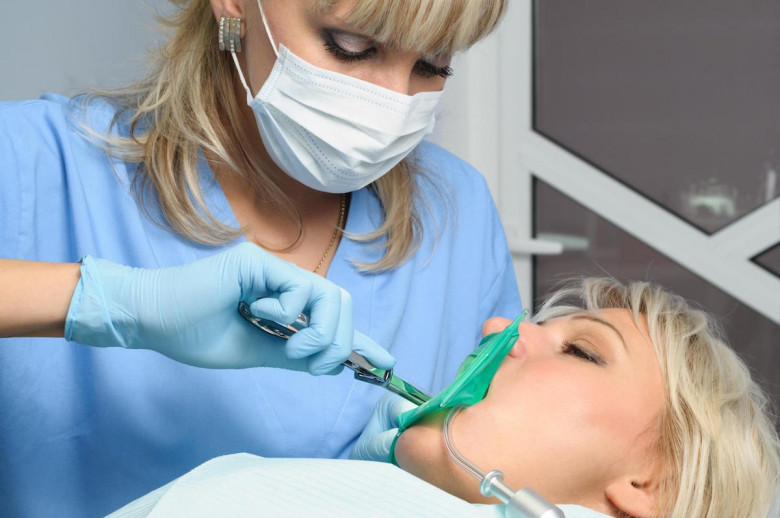views
Recovering from a tooth extraction doesn’t have to be difficult—especially if you follow the right aftercare steps. Whether you've had a simple or surgical removal, the days following the procedure are crucial to prevent complications such as infection or dry socket. For patients undergoing Dental Extractions in Dubai, top clinics typically provide comprehensive instructions, but it’s still helpful to understand the full spectrum of care on your own. Below is your ultimate guide to tooth extraction recovery, from managing pain to knowing when to call your dentist.

Control Bleeding Immediately After Extraction:
Bleeding is expected during the first few hours after a tooth extraction. Your dentist will provide gauze pads to help form a clot and minimize further bleeding.
To manage bleeding effectively:
-
Bite down gently but firmly on the gauze for 30–45 minutes
-
Replace the gauze as needed, following your dentist’s advice
-
Keep your head elevated to reduce blood flow to the extraction site
-
Avoid spitting, rinsing, or sucking for the first 24 hours
-
If bleeding persists beyond a few hours, contact your dentist promptly
Controlling bleeding early on sets the foundation for successful healing.
Manage Pain and Swelling:
Discomfort after a tooth extraction is completely normal and can typically be managed with over-the-counter or prescribed medication.
To reduce pain and swelling:
-
Take pain medications exactly as prescribed
-
Apply an ice pack to your cheek for 15–20 minutes every hour for the first day
-
Avoid hot or spicy foods that may irritate the area
-
Elevate your head while sleeping to limit swelling
-
Don’t skip doses, even if the pain seems minimal initially
Pain should begin to subside after a couple of days, not intensify—if it worsens, reach out to your dentist.
Stick to a Soft Food Diet:
Eating the wrong foods too soon can dislodge the clot and delay healing. A soft diet is essential in the first few days post-extraction.
Safe and soothing food choices include:
-
Yogurt, pudding, and applesauce
-
Scrambled eggs and oatmeal
-
Smoothies (without a straw)
-
Mashed potatoes and soft steamed vegetables
-
Ice cream or sorbet (without crunchy toppings)
Gradually reintroduce solid foods as your mouth heals and your dentist approves.
Avoid Harmful Habits That Delay Healing:
Certain actions can disrupt the clotting process and cause complications such as dry socket, a painful condition where the protective clot becomes dislodged.
Avoid the following during the first few days:
-
Smoking or vaping
-
Drinking through a straw
-
Spitting forcefully or rinsing too early
-
Touching the wound with your fingers or tongue
-
Consuming alcohol, which can slow healing and interact with medications
Breaking these habits, especially in the initial 48 hours, can make a huge difference in your recovery.
Keep Your Mouth Clean (But Gently):
Oral hygiene remains important, even during recovery—but it must be done with care to avoid irritating the extraction site.
Hygiene tips post-extraction:
-
Brush and floss other teeth carefully, avoiding the extraction area
-
Use a saltwater rinse (1/2 teaspoon salt in warm water) starting 24 hours after the procedure
-
Avoid commercial mouthwashes containing alcohol
-
Rinse gently after meals to keep the area free of debris
-
Do not rinse vigorously or use water that’s too hot
Keeping the area clean helps prevent infection while promoting healing.
Rest and Allow Time to Heal:
Giving your body the rest it needs after a tooth extraction speeds up recovery and reduces your risk of complications.
Resting tips for better healing:
-
Take 1–2 days off from work or strenuous activities
-
Avoid bending over or lifting heavy objects
-
Keep your head elevated when lying down or sleeping
-
Limit talking if it causes discomfort
-
Listen to your body and don’t push through pain
Physical exertion too soon can increase swelling or disrupt clot formation.
Watch for Warning Signs of Complications:
While most extractions heal without issue, it’s essential to monitor for signs that something might be wrong. Early detection can prevent more serious issues from developing.
Contact your dentist if you notice:
-
Bleeding that doesn’t stop after several hours
-
Severe or worsening pain beyond day three
-
Fever or chills indicating infection
-
Swelling that increases instead of decreases
-
A bad taste or foul odor coming from the site
-
Pus or visible discharge
Clinics offering Dental Extractions in Dubai are well-equipped to handle post-op care and answer concerns quickly.
Plan Your Follow-Up and Long-Term Oral Care:
To ensure the extraction site heals properly and to discuss tooth replacement options if needed, attending your follow-up appointment is vital.
Steps to take after initial healing:
-
Keep your follow-up visit even if you feel fine
-
Ask about permanent solutions like bridges, implants, or partial dentures
-
Return to your regular oral hygiene routine gradually
-
Schedule routine cleanings and exams to monitor oral health
-
Consider quitting smoking to improve long-term healing outcomes
Proper follow-up care closes the loop on a safe and successful recovery.
Final Thoughts:
Recovering from a tooth extraction doesn’t have to be complicated, but it does require attention and care. By following these aftercare tips—controlling bleeding, eating the right foods, avoiding harmful habits, and monitoring for complications—you’ll put yourself on the path to faster healing. Patients who undergo Dental Extractions in Dubai often benefit from world-class care and detailed instructions, but your personal responsibility plays a crucial role in how well you recover. Stick to your dentist’s advice, take things slowly, and know when to ask for help. With the right aftercare routine, you’ll be back to feeling normal in no time.


Comments
0 comment